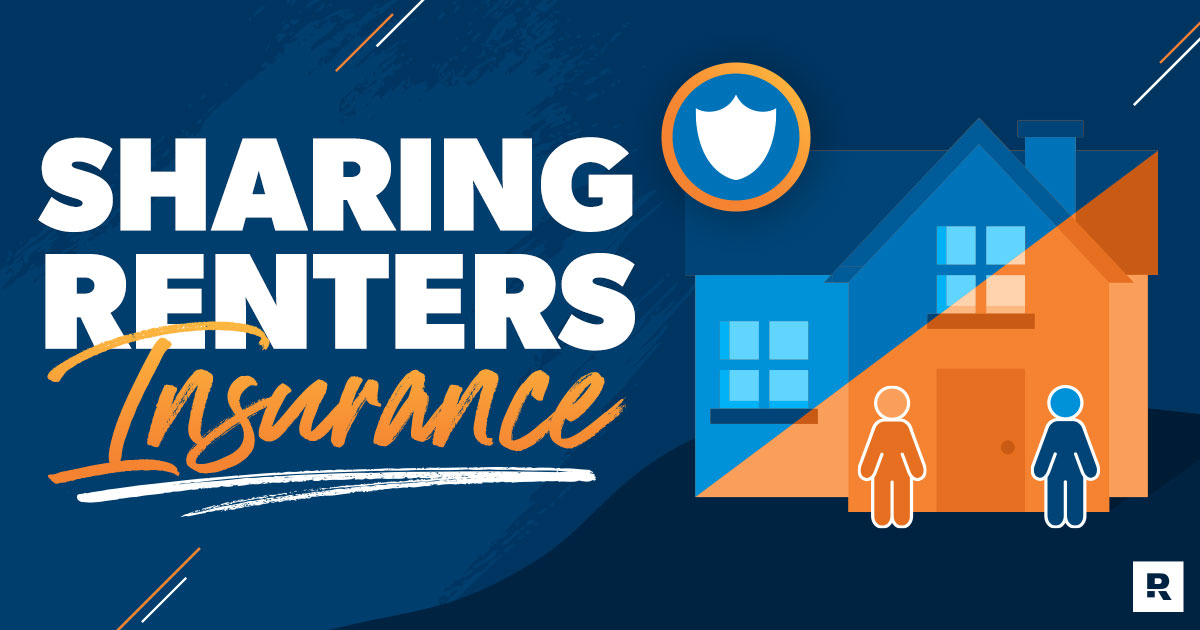Can I Share Renters Insurance With My Roommates?
7 Min Read | Nov 25, 2024

Roommates share. It’s just what they do. If you’re living with others under one roof, you’re most likely sharing a living room, kitchen, groceries, maybe even a bedroom, and . . . renters insurance?
Is it a good idea to share renters insurance? With the price of everything going through the roof, is splitting renters insurance with your roommates a good way to save some extra cash?
While sharing renters insurance might seem like the perfect life hack, we don’t recommend it. Here’s why.
What Is Renters Insurance?
First, let’s take a quick look at what renters insurance is. Renters insurance is a kind of property insurance that covers your stuff if it’s damaged or stolen. Similar to homeowners insurance, it protects you from catastrophes like fires, sewer backups and explosions and gives you liability from accidents on your property. Without renters insurance, you would be on the hook to replace your things (and your landlord’s insurance only covers the building, not your stuff).
Does My Renters Insurance Cover Roommates?
No. If your roommate has renters insurance, she has insurance for her—not you.
While some insurers do offer one policy for multiple roommates, this isn’t a good idea. You would have to specifically add them to the policy. And if your apartment was damaged in a fire, the insurance company would only reimburse people named on the policy.
Does Each Person in an Apartment Need Renters Insurance?
Yes, if you’re renting, you need renters insurance. And each roommate should have their own policy. This way everyone’s stuff is protected and you don’t have to worry about adding an extra layer of complexity to your coverage. You won’t have to do any mental gymnastics trying to figure out who is covered for what (it’s hard enough divvying up rent, utilities and groceries). The money you would save just isn’t worth the risk.
Can I Share Renters Insurance With My Roommates?
Yes, technically you can—as long as state law and your insurance company both allow it. (Sometimes it’s not possible.) But we’re going to shoot straight with you: It’s not a good idea to share renters insurance with roommates.
Here are five reasons it’s really not wise.
1. Increased Premium
The first downside is that your rate will go up. We don’t have to tell you why that’s . . . less than ideal.
2. Claims History
Your rate could also rise if your roommate makes a lot of claims. And each claim your roommate makes is added to your claim history. That’s not good. Better to just keep these separate.
And another warning. If you’re added to your roommate’s policy—and you both make a claim—the insurance company will pay your roommate, and you’ll have to figure out how to split the check. If you totally trust your roommate, this might not be a big deal. But obviously it could turn into a sticky situation pretty quickly.
3. Liability Protection
Liability protection is the part of your insurance that covers you if you’re found liable for an accident on your property. If you share renters insurance with roommates, you could be held partially responsible if your roommate did something that caused legal or medical expenses (like their dog bites someone). You’d be tied to these claims and, again, they’d be added to your claims history.
4. Splitting Up Limits
A shared renters insurance policy also means you’re sharing the policy limit. For instance, if you get $15,000 of property coverage, it’s not $15,000 for each of you. You would have to work together to estimate how much you both need. And you would most likely have different coverage needs. One of you might have more expensive items, which means you’d have a more expensive policy. Again, this could get real complicated real fast.
5. Removing Roommates
If your roommate moves out, guess what? You have to take them off the policy and get a brand-new one. So now you’re shopping for a new roommate and a new insurance policy.
Protect your home and your budget with the right coverage!
These are just some of the reasons it’s better to just get your own policy. It might seem like you’re saving money, but it’s simply not worth the hassle. Plus, if your roommate is in charge of paying the monthly premium, and they miss a payment, you’re suddenly at risk of being uninsured.
When Does Joint Renters Insurance Make Sense?
The only time it might make sense to share a renters insurance policy is if it’s a relative or spouse. But first, make sure your state allows it, your insurer is on board with it, and that you are both named on the lease. Otherwise, your shared renters insurance policy could turn into a shared mess.
Do I Need Renters Insurance if I Live in a College Dorm?
If you’re a student living in a college dorm, you’re probably covered under your parents’ homeowners or renters insurance policy. But still double-check to make sure. And if you’re living off-campus because you just couldn’t stand the idea of living in that tiny shared dorm, you’ll need to get your own renters insurance policy.
How Do I Add Roommates to My Renters Insurance Policy?
If you still think you want to get a renters insurance policy with a roommate (don’t say we didn’t warn you), here are some tips on setting up your policy to make sure you’re covered.
Inventory Your Stuff
Any time you’re getting property insurance, you should make an inventory of your belongings. Take photos and videos of your things so you have a thorough record of what you own and how much it’s worth. This becomes even more important when you’re sharing a policy. Make sure you both have a clear understanding of who owns what and how much your share is. This way you’re both covered.
Get the Right Property Limits
After you create separate inventories, add up your amounts and make sure you have the right level of coverage. If you need to, increase your limits so you will each get paid the right amount if you have to make a claim. Never forget that the overall property limit ($20,000, for example) is not per person. And just because you add your roommate doesn’t mean your insurer will automatically increase your limits to cover them.
Name Them in the Policy
The final step is to make sure each of you are specifically named in the policy. Call your insurer to add your roommate to the policy and make sure both of you are also named on the lease.
And before you sign the paperwork, have a clear discussion with your roommate about expectations so you’re both on the same page.
Get the Right Coverage
Splitting renters insurance with your roommates just isn’t a smart move. And keep in mind that renters insurance is super cheap. The average monthly premium is around $15 per month.1 Getting a shared renters insurance policy is not worth the potential mess. (And let’s face it. There’s probably enough drama already.)
To get set up with the best renters insurance policy, we recommend working with one of our home insurance agents who is part of our Endorsed Local Providers (ELP) program. They’re RamseyTrusted and can make sure you get enough coverage to, well, actually cover you.



